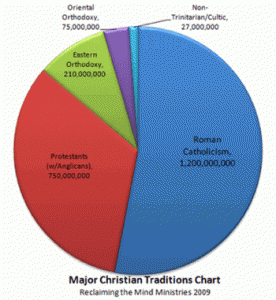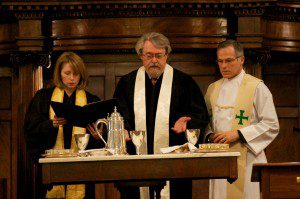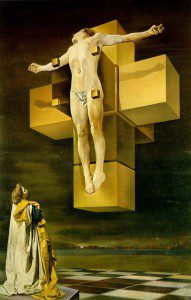In response to something I wrote in my last post to this blog someone thinking the Book of Enoch was in the Catholic canon objected to it being cited as a source for something being “Christian.” Setting aside that wasn’t a position in my post, in fact Enoch is considered canonical only by the Ethiopian church, it raised a host of questions. I wasn’t sure if the writer thought Catholics were not Christians, as in the old American Protestant canard, “Catholics and Christians,” or, just that something only held by Catholics should not be considered Christian? Or, something even further down the rabbit hole?
In any case, it caused me to reflect a bit on just who is a Christian. And, of course, who is not…
My first thought was that given the numbers, and, well, history, Catholics would probably have to be considered “normative” Christians. While all others would be some sort of variation on the theme.
Of course that isn’t the only way to call it. Most Christians, Catholic, Orthodox both Eastern and Oriental, and the majority of Protestants can appeal to the Nicene Creed, or close variations. And, rather older, people can also say a Christian is anyone who can call “Jesus Lord.” That last one leaves lots and lots of room for interpretation. And opens the even more wildly open position, a Christian is someone who calls herself a Christian. 
In that essay that spawned the response that led to this meditation, I also noted while I am a Zen Buddhist of a liberal sort, I also consider myself a cultural Christian. Whether, I would add, I like it or not. While those who feel there needs to be a second birth, an adult claiming of the faith, that doesn’t seem to be a position held always and everywhere in the Christian community. So, a complexity, no doubt.
I see myself Christian in much the same way a Jew considers herself a Jew, whether an atheist, whether going to synagogue or temple ever. Of course, Judaism is a tradition that claims a genealogical connection, if your mother is Jewish, then, so are you. Unless you take some dramatic steps to disassociate yourself. And even then, probably not.
While I was raised in one of the many splendored variations of Baptist, I see this sense of cultural Christian most clearly among people raised Catholic. And, as I recall from a silly little book some decades ago explaining what was Jewish & what was Goy, even as New York is Jewish and Los Angeles is Goy, while Lutheran is Goy, Catholic is Jewish. It’s a thing.
And Christian in some ways is a thing. It is a cultural reference that I know from the bottom of my feet to the highest follicle of hair on my head. For me it is more Protestant, although as an adult I have developed a taste for the Catholic lite (all the rituals, half the guilt) variation in Anglicanism, my practices as a Unitarian Universalist are of a barely Protestant expression.
And it remains true even as my understanding of the deepest things are found within Zen and its practices, and are expressed most clearly by some ragged Chan monks in Medieval China, as well as some of their later admirers.
Still, in some very real way, Christian.
So, if for some awful turn of events I was in the hands of Isis, in all likelihood I would meet my fate not because of my professed Zen Buddhism, but because I would be perceived as Christian. It’s how I stand. It’s how I talk. Mostly…
Christian.
More or less. Okay, emphasis on that less. Marginal.
But.
If you hold your head to the side and squint.
Still…
Christian.













